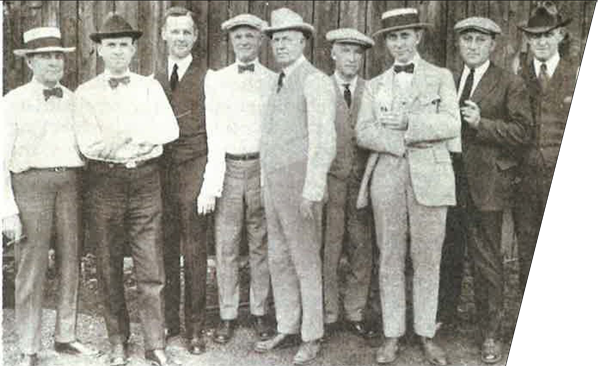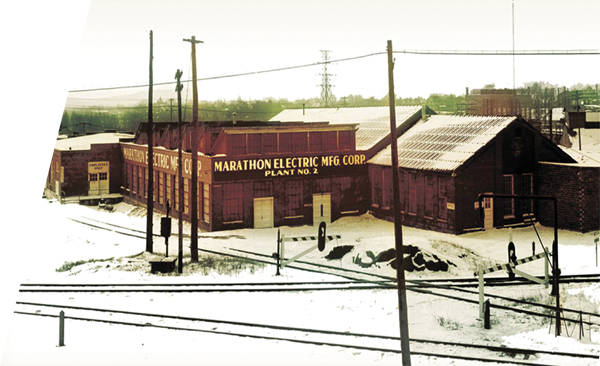About Us

It was 1913 when two Chicagoans headed north with the dream of starting their own motor manufacturing plant. E.M. Bischoff, a Westinghouse Electric salesman and Justin Lebovic, a Westinghouse design engineer, had everything they needed except capital. Fortunately, there was a group of enterprising men in Wausau who wanted to turn around a declining lumber town by setting up a diversified economy. The investors, known as the Wausau Group, included Cyrus Yawkey, John F. Ross, George S. Gaylord, Charles Winton, Walter Alexander, Walter Bissell, D.C. Everest, Brown Kutzenbach, Aytchmonde P. Woodson and Judd S. Alexander.
With the organizational leadership and financial backing of the Wausau Group, Marathon Electric got off to a fast start. Judd S. Alexander became Marathon's first President, and the 12,000-square-foot manufacturing facility at 26 Island Street began producing just one motor product. The 1 / 4 horsepower motors, used to run washing machines, provided first-year sales of $35,000.
It was in 1931, the start of the depression, when James J. Wall joined Marathon Electric as Secretary-Treasurer and General Manager. By 1932, in the middle of the worst economic period in the nation's history, Wall produced a modest profit of $1500! Those sales records indicate that Marathon Electric had been manufacturing approximately 17,000 motors per year when Wall took over. By 1932, the company was producing nearly 57,000 motors per year, primarily for customers like Speed Queen Washing Machines and Delta Tool.
By 1940, when J.J. Wall became President, the company was producing 200,000 motors per year in it's present plant at Randolph and Cherry Street. Although demand tapered off during World War II, Marathon Electric contributed to the war effort by producing motors for the expanding industrial, commercial and residential pump industry.

Following the war, electric motor sales took off again. As usual, J.J. Wall was prepared. By 1947, he had built a new 72,000-square-foot plant in Wausau, WI, which allowed increased production to a record 312,000 motors per year.
In 1947, we expanded into a new fractional motor plant in Earlville, Illinois. (That plant closed in 1981.) In· 49, we purchased Burke Electric Company in Erie, Pennsylvania, a large motor manufacturer dating back to 1896, and whose founder was a friend of Thomas Edison. (Erie products moved to Wausau in 1967.)
From 1965 to the l970, various business ventures were begun to explore new products and markets. Names like Firing Circuits, Marathon Research of Canada, Avtek, and Nogales will bring back memories for some of you. Robert V. Jones served as President during the period from 1960 to 1975.
The '70s saw Marathon expand even more. Under the leadership of President Edward L. O'Neill (1975-1976) and Vincent R. Simpson (1976-1980), the following major items were accomplished. The new electric foundry was built in Wausau in 1970 to support the demand for more cast iron. In 1976, the West Plains, Missouri plant was built to manufacture fractional motors. In 1977, a new state-of-the-art engineering laboratory was added at Wausau.
The 1980s continued with both acquisitions and change. Russ Hale served as President from 1980 to 1988. During that time, a new small integral motor plant was built at Lebanon, Missouri, in 1980. In 1981, we introduced the Blue Chip Motor Line, a high-efficiency line to meet the increasing demand for energy conservation. Lima Electric was purchased in 1986. The Lima, Ohio facility was seen as an important addition to our generator production. With Lima, Marathon became the largest independent manufacturer of generators in the world.
John A. Slayton took over the Presidency in 1988 and brought us all "Back to the Basics" of quality and profitability. From 1989 to 1998, Harry Baker, his president, improved and committed to continuous quality improvement, and the highest level of customer service.
During this period, Marathon introduced many of our actually recognized brands BlueMAX® and BlackMAX®, XRI® and Max® Guard. Also, Fidelity Electric was purchased expanding our Marathon pancake generators offer from 5-20kW.
It Was during Baker’s presidency that Regal Beloit a Beloit, WI Company acquired Marathon in 1997.From 1998 to 2004, James L. Packard from Regal Beloit directed our company, and it was during this time that our company expanded its global presence not only with the introduction of our IEC motors, but also with the portfolio offering up to 10MW and generators up to 2250kVA
In the 20’s Mark Gliebe took the leadership from 2004 to 2019 as CEO of Regal. Following the market trends, Marathon was a more sustainable company focused on efficiency, so the permanent magnet motors were introduced, allowing Regal to introduce to the market Ultra high-efficiency IE5 Motors.
In 2019, a new manufacturing site was built in Monterrey, with 250,000 sq Ft to produce Motors and Generators.
Louis Pinkham took the CEO position from 2019 to 2024, during his leadership Marathon Focused on 80-20 and Lean manufacturing, which allowed us to be more productive.
Marathon now boasts a workforce of 2,800 employees across the United States, Canada, Mexico, India, and China. Recognized for its strong market presence, rich history, and industry reputation.
Marathon caught the attention of the global motor leader, the WEG Group, thanks to its innovative approach and commitment to excellence. In May 2024, WEG made a significant investment in Marathon and officially acquired the company. This marks the beginning of an exciting new chapter, with a shared vision of driving efficiency, innovation, and sustainability to new heights.
With WEG’s extensive resources and expertise combined with Marathon’s proven track record, we are confident in building an even brighter future together. We are excited about the opportunities ahead and the positive impact this partnership will bring to our industry and customers.